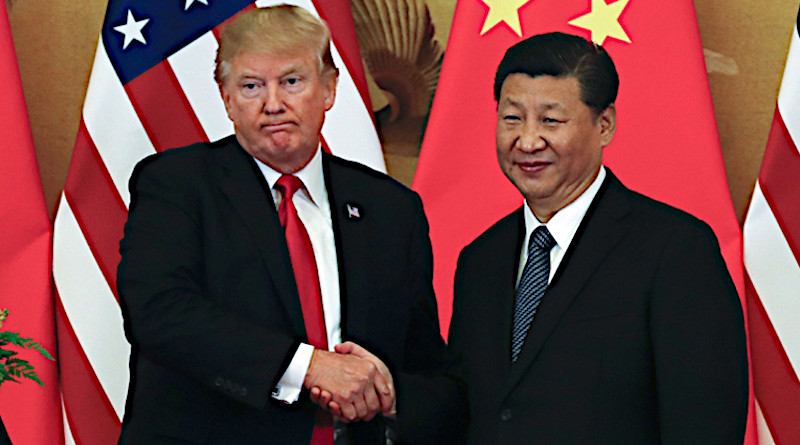


On February 5, 2025, President Donald Trump enacted a 10% tariff on all Chinese imports, marking a significant escalation in the ongoing trade conflict that began in 2018. This new tariff took effect immediately at 12:01 a.m. ET, prompting China to announce retaliatory tariffs on select American products, including a 15% tariff on coal and liquefied natural gas (LNG), and a 10% tariff on crude oil, agricultural machinery, and large-engine cars, effective February 11, 2025. Additionally, China lodged a complaint with the World Trade Organization (WTO), claiming that U.S. tariffs violate international trade rules, initiating a 60-day resolution period.
In a more coordinated response compared to the previous trade war, China has also added U.S. companies like PVH Group and Illumina to its 'unreliable entity' list, which could further complicate trade relations. This action is part of a broader strategy to counter perceived discriminatory practices against Chinese firms. Furthermore, China plans to restrict exports of critical minerals such as tungsten and gallium, which are vital for U.S. technology, impacting U.S. manufacturers and heightening concerns over supply chain vulnerabilities.
In the lead-up to these new tariffs, U.S. imports surged to a record high of $364.9 billion in December 2024, a 3.5% increase from November, as businesses rushed to secure foreign goods ahead of potential tariffs. This surge contributed to a widening trade deficit, which reached its highest level since March 2022. Notably, exports fell by 2.6% to $266.5 billion during the same period, reflecting the growing economic tensions. China experienced a $25.3 billion trade deficit with the U.S. in December, further illustrating the impact of these developments [ebc32167].
China's response to the latest tariffs has been described as calculated, notably avoiding new tariffs on U.S. agricultural products, which are worth about $35 billion annually. This strategic choice may reflect China’s desire to mitigate the impact on its own economy while still retaliating against U.S. actions. Additionally, China has launched an antitrust investigation into Google, coinciding with the tariffs announcement, indicating a multifaceted approach to the trade conflict.
As tensions rise, President Trump has shown indifference towards China’s retaliatory measures, stating, "That’s fine," and indicating he is in no hurry to negotiate with Chinese President Xi Jinping, despite China giving him a six-day window to avoid further escalation. White House spokeswoman Karoline Leavitt confirmed that a call between Trump and Xi is still to be scheduled, adding to the uncertainty surrounding future negotiations.
In the shipping sector, Hapag-Lloyd's CEO Rolf Habben Jansen expressed confidence in the company’s ability to manage U.S. tariffs on Chinese products, stating, "It is too early to push the panic button" during a press conference on February 5, 2025. He noted that previous tariffs during Trump’s first term (2017-2021) did not significantly disrupt global trade. Habben Jansen projected a 2.8% to 3% rise in shipping volumes for 2025, with Hapag-Lloyd expected to grow slightly above the industry average. The company’s Gemini cooperation with Maersk started on February 1, 2025, enhancing their shipping network of 340 ships. Preliminary earnings for 2024 indicated a quadrupling of earnings in Q4, with comprehensive earnings to be released on March 20, 2025 [4f822c06].
The economic implications of these tariffs are significant. The U.S. steel sector has already experienced a decline, with employment dropping by 4,000 jobs from 2018 to 2020 due to the tariffs. Moreover, tariffs on washing machines led to a 12% price increase, costing American consumers an additional $1.5 billion. Experts warn that tariffs on imports from China could affect over $450 billion worth of goods, including electronics and consumer products, which could lead to increased prices for American consumers. A Tax Foundation analysis estimates an average tax increase of over $800 per U.S. household in 2025, while proposed tariffs on Mexico and Canada could significantly raise grocery prices, especially for avocados and tomatoes. Tariffs could add $2,700 to average vehicle prices, and since 70% of softwood lumber and gypsum imports come from Canada and Mexico, construction costs are expected to rise as well [78b7517c].
Analyst David Roche has warned that the new tariffs could push China’s economy close to recession, estimating a potential GDP growth reduction of 0.3% to 1% as a result of the tariffs. In the U.S., the economy is also expected to suffer, with predictions of a 1% decline and an inflation increase of 0.8%.
As the trade war unfolds, geopolitical implications are becoming apparent, with China potentially strengthening ties with alternative trading partners as a result of U.S. tariffs. The yuan is under pressure, trading at approximately 7.3340 per dollar, reflecting market reactions to these developments.
Looking ahead, the potential outcomes of this escalating trade conflict could range from prolonged conflict to a temporary truce or even a comprehensive trade deal. Sir Keir Starmer has indicated that the EU will not take sides in the trade war, while Ursula von der Leyen of the EU has expressed readiness for tough negotiations with the U.S. Goldman Sachs estimates that a 10% rise in U.S. tariffs could reduce EU GDP by 1%, highlighting the global economic stakes involved.
As trade policy uncertainty reaches an all-time high, analysts predict further tariffs are likely, complicating the international trade landscape. Amid these developments, the Hang Seng China Enterprises Index rose 3.5%, suggesting some market stability despite the tensions. Furthermore, Larry Hu has suggested that China might focus on domestic stimulus measures instead of escalating tariffs, indicating a potential shift in strategy.
Under 'Trumpism 2.0', Trump's tariffs are partly justified by the fentanyl crisis, with potential symbolic concessions from China. The suspension of the de minimis rule could disrupt Chinese e-commerce giants like Temu and Shein, while Trump’s policies may reinforce Xi Jinping’s push for economic self-sufficiency. The concept of 'friendshoring' is becoming outdated as Trump prioritizes U.S. manufacturing, and the administration has weakened U.S. national security measures, impacting countermeasures against Chinese influence. The article draws parallels between Trump and past presidents like Reagan and Roosevelt in shaping economic cycles [b026b073].